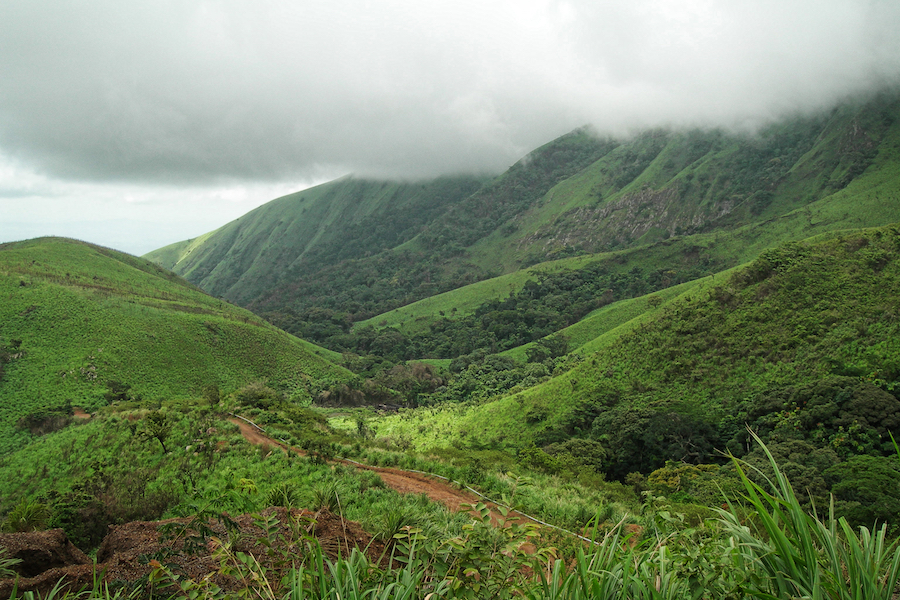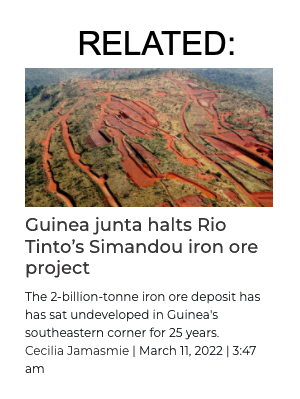Billionaire Friedland banks on Liberia’s railway to tap Guinean iron

A mining company controlled by billionaire Robert Friedland is counting on getting access to a Liberian railway in order to develop its Nimba project in neighboring Guinea, one of the largest untapped iron ore resources.
High Power Exploration Inc. wants to begin development of Nimba — located near Liberia’s border and estimated to hold 1 billion tons of high-grade iron ore — next year. That likely requires being able to use a railway that feeds Liberia’s Buchanan port and which is being upgraded by ArcelorMittal SA, as routing supplies to terminals in Guinea and Ivory Coast is much harder.
The Liberian government is now examining an amended agreement to let multiple users access the Yekepa-Buchanan rail line and port, but it’s not clear what the extent of that access will be.
Guinea has huge iron ore reserves — including the giant Simandou deposit — but has never been able to develop mines because of long-running disputes over ownership rights and the large investment needed to extract and transport ore. Finally getting a project up and running would be a big boost for the country and would start bringing more supplies to the market.
“A major attraction when you develop a bulk commodity type project is to be able to be not too far from a port and, even better, to have access to an existing infrastructure,” Guy de Selliers, chairman of Societe des Mines de Fer de Guinee, HPX’s subsidiary in Guinea, said in an interview. “The location of the project is one of its assets.”
HPX estimates it will cost almost $2.8 billion to develop Nimba, including $600 million for other rail and port development in Liberia. It’s targeting the first production in 2027 and wants to eventually extract roughly 450 million tons.
While ArcelorMittal has spent more than $500 million and will invest a further $200 million on the rail line and Buchanan port, the decision on who can use the link rests with the amended agreement that’s yet to be passed into law.
The amended agreement the government is looking at “establishes a very comprehensive non-discriminatory multi-user access regime for the rail and port,” the Luxembourg-based steelmaker said by email.
For HPX, the alternatives aren’t as attractive. It could build a railway through Ivory Coast to get material to a port, but that would take longer and need the help of other mining operations to justify it, de Selliers said. And Guinea itself doesn’t have the necessary infrastructure.
That’s partly why the Simandou deposit has remained in limbo. Interim President Mamadi Doumbouya, who seized power in a September coup, initially encouraged Rio Tinto Group and China-backed SMB Winning Consortium to work together to develop Simandou. But his government on Thursday night said operations should stop, citing a lack of progress in talks between the two parties.
SMB Winning Consortium had already started work on a 650-kilometer (404 miles) railway linking the mine to the port.
(By Katarina Hoije and Leanne de Bassompierre, with assistance from Thomas Biesheuvel and Ougna Camara)
{{ commodity.name }}
{{ post.title }}
{{ post.date }}





3 Comments
Prince F. Forfor
Good initiative!!!
Franklin Sah Daniels
Am glad to hear that seeing these mutual funds been put into functional agreement for the future to be herewith is, bravo to you all ladies and gentleman,am from Liberia born in LAMCO YEKEPA
Franklin Obed Siakor
Good news for Liberia